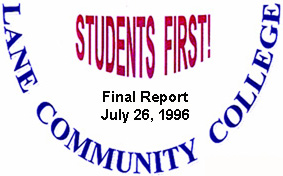| Lane Home Page | Search Lane |
| Website Accessibility |

STUDENTS FIRST! PROCESS REDESIGN Return to Change Proposal List SERVICE: Information System: Printed Materials Current Situation: Printed information concerning services to students is available from a variety of sources:
Students receive the majority of written information concerning services, courses, policies and procedures from the class schedule and catalog. Both instructional departments and departments that provide services to students develop their respective information and send it to Institutional Advancement. Institutional Advancement (IA) collects information from all college departments and writes the general college-wide information (features articles, etc.). IA is responsible for editing, rewrites, layout, proofing, and working with printers and graphic designers. More than twenty instructional departments in coordination with Curriculum and Scheduling are responsible for providing all of the course content information for their respective departments. Over ten additional departments that provide services to students are responsible for developing the information concerning their services. There are also several other departments that provide information relevant to students including the Bookstore, Library, Student Activities, and Study Skills. In addition, various individual instructional and service departments produce separate brochures. Discrepancies in the information created in individual departments and information created in individual departments in services to students may go unnoticed because they are gathered outside of services to students departments. The class schedule and catalog are used for multiple purposes beyond use as general information tools including advising and marketing. During input sessions, many employees shared dissatisfaction with the information provided in both the class schedule and catalog. Many employees suggested that both the class schedule and catalog are inadequate as informational tools. Information is inconsistent and not user-friendly for finding what is needed in a timely manner. In addition, students in input sessions commented that information in the class schedule is not consistent with the catalog. Employee and student input suggests dissatisfaction with design of class schedule and catalog. Students and employees indicated that both documents need improvement. Both students and employees indicated that layout of information is confusing. Information that students consider to be similar is not organized in a way that makes sense. Students commented that information on registration times, testing, orientation, and the bookstore is scattered. Desired Situation: All services to students information is gathered and created in one place, including information from the Outreach Centers and Continuing Education. All services to students information contained in the catalog, class schedule, brochures and student handbook is accurate and consistent. Services to students information standards are created and design and language standards are adhered to. All standards satisfy Lane's needs. All services to students printed information be consistent with information on the World Wide Web, and Wide Area Network. Proposed Solution: The OSRL survey indicates that seventy-six percent of respondents use the class schedule as the primary resource for finding out how to sign up for class. Since this tool is so widely used by students, it is imperative to keep this information accurate, consistent, and easily understood. The Students First! Information Support Team will be responsible for gathering all information from services to students departments and outreach centers. In addition they will review all documents, handbooks, and brochures in coordination with the Students First! Center Teams and Institutional Advancement. The team will check for consistency and accuracy across functions in the information gathered from all of the services to students departments. Institutional Advancement will continue to have primary responsibility for the class schedule and catalog. Data from Maricopa County Community College District stressed the importance of establishing a common language across departments, including a consistent look and feel to all printed materials. In order to keep information consistent, language standards will be created to help avoid multiple terminologies. This will help both employees and students avoid confusion. Institutional Advancement and the team will establish mutually beneficial standards for design and common language. They will reconcile multiple purposes of information to ensure that the needs of the student as well as the college are met. Data from a site visit to Linn-Benton Community College indicated that the uniform look of publications (handbook, catalog and class schedule) showed an increase in student and employee satisfaction of those printed materials. The Information Support Team will work with Institutional Advancement to ensure a consistent design and format of applicable print materials.
Coach (from Redesign Team): Rich Freund, Johanna Hanley
Action Plan For Implementing Solution:
Return to Part Four of the Redesign Change Proposals |
>> Return to Lane's Home Page >> Return to Process Redesign Project Main Page >> Return to top of page Lane Community College - Process Redesign Project 4000 East 30th Avenue, Eugene, OR 97405 Please direct comments about this site to webmaster@lanecc.edu Revised 12/2/96 (llb) © 1996-present Lane Community College |
